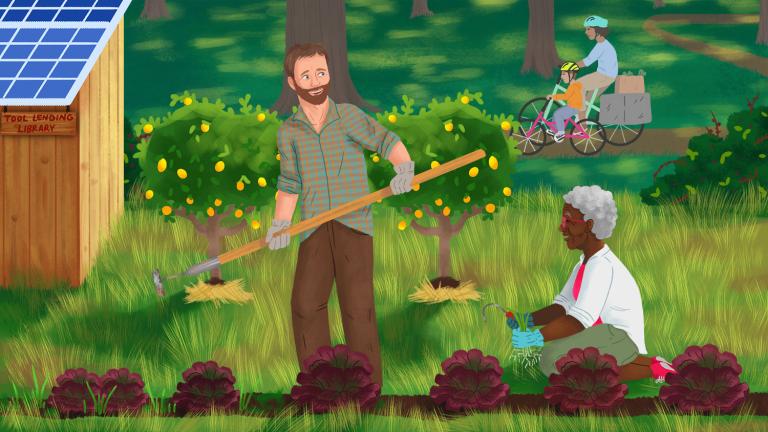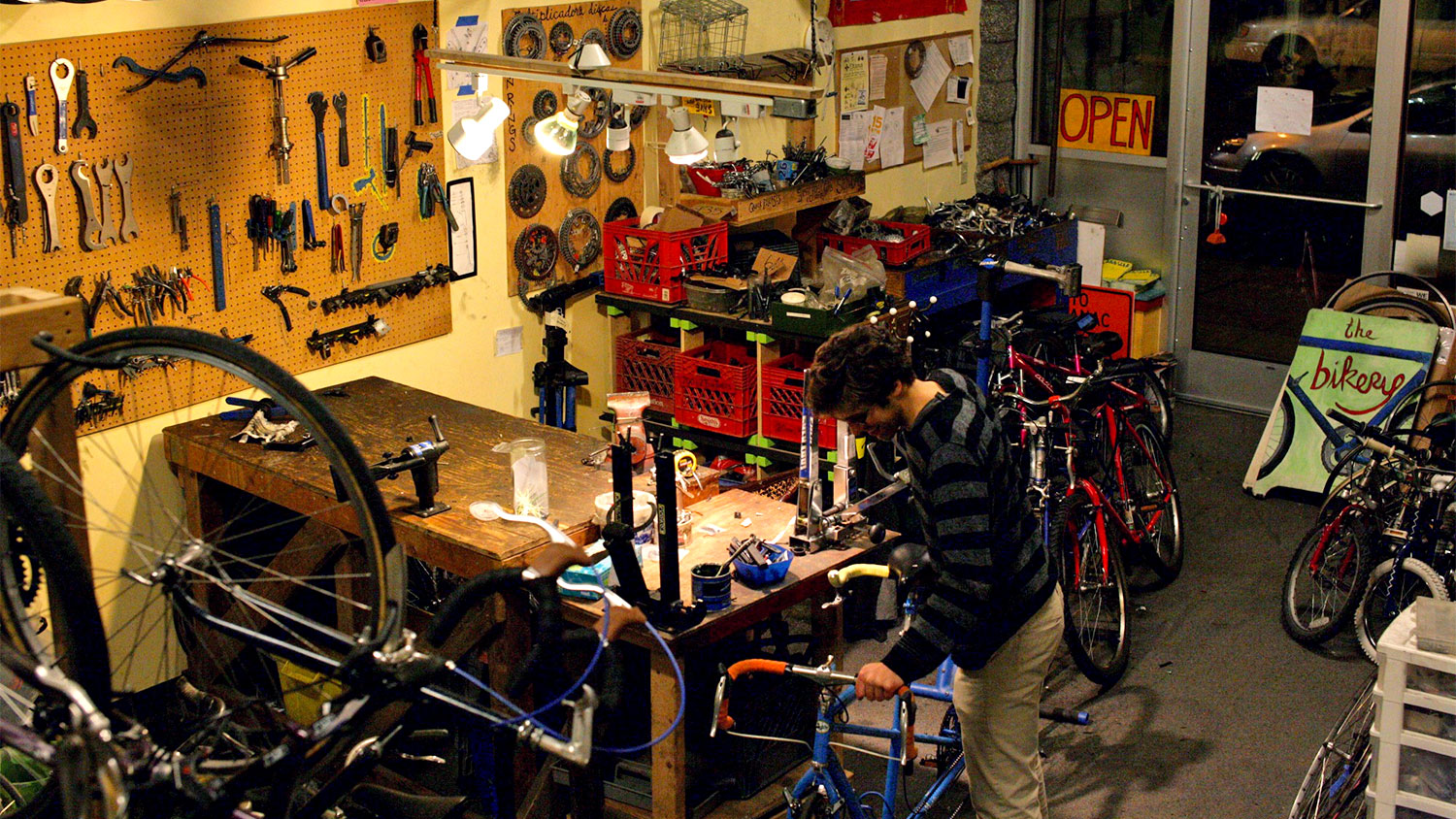Each morning and evening, I ride by the Bikery. It sits along a designated bike corridor for all who travel between Seattle and the Eastside ‘burbs. Hundreds of daily commuters pass the Bikery.
I stop in from time to time to look for, say, cleats to fit my pedals or a specific handlebar attachment piece for my bike light, each time finding precisely what I seek among the space’s well-organized mountains of parts and accessories. The non-judgemental help is why I really love the Bikery, though. Just last week, a super-patient volunteer mechanic named Harmony saved me from unnecessarily replacing my brake pads, simply by teaching me how to tighten my brakes. Yes, I am mechanically inept.
The Bikery isn’t your typical bike shop. It’s a not-for-profit, volunteer-run bicycle cooperative focused on making cycling and bike repair accessible to everyone. Here’s how it works: You fix your bike yourself, with help from volunteers. You can use the space, equipment, and on-hand instructional assistance for $5 an hour — or you can “pay” by volunteering your time at the Bikery. The donated pieces of used bicycle and gear populating the shop can likewise be purchased for a few bucks or some work.
In essence, it’s a time bank. Everyone’s hours and skills are valued equally. Regular volunteers often rack up so much credit they stop keeping track.
The Bikery is part of an emerging movement of bicycle cooperatives, often called bike kitchens. These projects are popping up everywhere from Athens, Ohio, to Athens, Georgia, to Athens, Greece. Each co-op works a bit differently, but they’re all part of the real sharing economy — that is, the sector of people, businesses, and communities devoted to collaborating for the greater good, not greater profits.
Chris Carlsson, author of the book Nowtopia, which is all about collaborative projects where labor is a pleasure rather than a wage-compensated burden, recounted the early days of the bike kitchen movement to me thusly: “[There are] tons of examples of places where young radicals came together to grab discarded bicycles and parts out of the waste stream — out of the funnel of suburban trash pickups — and started gathering those things and having a place where people could donate their discarded bikes, and then refurbish them and make them available to people for free.”
For projects like bike kitchens, though, the very fact that they provide abundance, affordability, and good use for capitalism’s dumpster dregs — things that are actually bad for economic growth — makes it difficult to survive in the super-competitive world they seek to change.
The Bikery’s story begins in 2006. A group of mostly social-justice activists wanted to cultivate collective bike knowledge and keep the community’s bikes humming. Cofounder Davey Oil says the founding group was “primarily concerned with anti-oppression, combating racism, sexism, classism, able-ism, and so on.” The environmental benefits — building and maintaining bikes with reused parts and shared tools, plus promoting the least-polluting transport mode besides hoofing it — were merely bonuses.
The Bikery was founded to “put the tools in the hands of the learners and challenge the concept of the ‘expert,’ in service of creating a space that would be accessible to people who were traditionally marginalized within bike culture — the same people who are the targets of systemic oppressions anyway,” says Oil. Basically, inclusive fix-it spaces don’t just benefit well-off white guys who don’t know how to use a spoke wrench (me); they serve entire segments of society that the mainstream cycling movement has largely ignored.
Two years passed before the group could lease a dedicated space. In the interim, the Bikery existed in garages, community centers, and even set up shop at a bank parking lot on Sundays.
Today, the Bikery still feels like a scrappy, shoestring operation. Unruly tools sprawl across workbenches, while donated and salvaged bicycle treasures fill cabinetry, pile in boxes, and hang from the walls.
And the space is only open on Saturday and Sunday afternoons, now that volunteer Forrest Baum, who ran the shop on Mondays last year, is busy applying for jobs. Which means it can’t serve the weekday commuter who breaks a spoke on the way home from work. Ahem.
Part of the problem: Bike kitchens require a lot of work to maintain. Like other volunteer-run cooperatives, bike kitchens have to compete for hours in people’s lives while the global economy grows to gobble up more and more of our time with its insatiable — and climate-wrecking — work-and-spend cycle.
Balancing unpaid work with making ends meet isn’t easy. “Seattle’s a really expensive city to live in, and that means you gotta work,” says long-time volunteer Wesley Barga.
I asked Baum if, ideally, he would just work at the Bikery. “I would do that daily if that was a full-time job, for sure,” Baum says. “It’s really rewarding.”
Right now, that’s not an option. It’s a wonder that the operation brings in enough ones and fives to pay the rent. Hiring staff is a far-off dream — turns out donated bike parts and shop hours don’t pay the bills.
So how can the Bikery get more folks to buy — er, volunteer — in, without compromising its core principles of accessibility and affordability?
In order for a sharing org like the Bikery to succeed and, ideally, inspire more groups to follow suit, it may need to — gasp — embrace the money economy. A “degrowth in action” initiative can’t be afraid to, well, grow financially. “They have to adapt to the world we’re in,” says Carlsson. “Most of the time, that involves losing some of the qualities they started with. … It is a very big paradox.”
Look no further than BICAS as a bike kitchen success story. Carlsson says Bicycle Inter-Community Art and Salvage was the first bike kitchen he ran into, over a decade ago. At the time, BICAS occupied a warehouse in Tucson, Ariz., and had an arrangement with the police and the local court.
“They created a project where youth could get diverted from juvenile hall or even jail for minor offenses, and instead be assigned to BICAS,” says Carlsson. The delinquent kid would be instructed to pick a bike from the hundreds rusting away in the space. The sentence: Strip it down and build it back up again. Once you can ride it home, you’ve served your time.
Now, BICAS is a thriving bicycle recycling and education center, with paid employees making sure it’s open six days a week. On the seventh day, it provides a safe bike workspace specifically for folks identifying as women, trans*, and femme. The transition from all-volunteer staffing to paid employees happened gradually and organically, as money allowed — from $20 a day to minimum wage to, these days, pay that’s competitive with local bike shops.
BICAS has raised cash through selling refurbished bicycles, brand-used parts, art made from scrap bike metal, and basic bike stuff like tubes, tires, and seats. The collectively run nonprofit also charges for classes on basic maintenance, building a bike, and cycle touring — although scholarships are available so anyone can learn — and receives some support from bike-related sponsors and a local brewery.
Troy Neiman is an artist who’s been involved with BICAS for over a decade. He says that attendees of the annual Bike!Bike! Conference, a gathering for community bicycle projects, voice strong opinions on whether paid staff has a place at bike kitchens. His response: BICAS couldn’t thrive without both its 13 employees and hundreds of volunteers — some trading their time for shop credit, others working off assigned community service hours.
The Bikery cofounder Davey Oil, who now runs a family bike shop that helps people use life-changing cargo bikes to transport themselves and their stuff, agrees that there need not be a contradiction between surviving as an organization and embodying the real sharing economy. “A bike kitchen can operate in a commercial space, with a certain level of attention to bookkeeping and financial sustainability,” he says. To Oil, an experienced anarchist organizer, the capitalism compromise need not, well, compromise a cooperative project’s mission.
And while the Bikery may be sputtering to stay afloat, it has a successful lineage: Some if its founders were once volunteers and organizers at BICAS.
As the Bikery’s original founders have moved on to other projects, Wesley Barga has taken a bigger leadership role among members. He wants to see the space open seven days a week, to be the community’s “bicycle living room” — not just a workspace, but a gathering place to relax and socialize. Here’s to hoping Barga & Co. make it happen.
And here’s to hoping that new bike kitchens keep popping up on this open-collaboration map of community bicycle organizations around the world — and more existing ones get marked (like the Bikery, hint hint). Who knows, maybe some nice hackers will create an app so that cyclists exploring new neighborhoods know where to find bike friends or fix a flat tire.
Just don’t, you know, sell the app to Uber.
This article is part of a series on the real sharing economy. Next, the series will explore how we can share something as fundamental as food — and how sharing enables more sharing.




